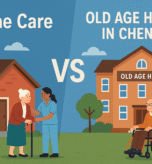Technology is transforming healthcare, including homecare services. In India, there’s a significant shift towards technology in home care services to improve care quality and access. This blog explores technology’s impact on the future of homecare in India.
Advanced medical devices and remote monitoring solutions enabled by technology can improve patient outcomes in homecare services. Healthcare providers can now monitor patients in real time, identify potential issues before they become serious, and provide timely interventions to improve patient outcomes, even from a distance.
Technology can also reduce healthcare costs in addition to improving patient outcomes. Telehealth solutions can help healthcare providers reduce the need for costly and time-consuming in-person visits. This improves access to healthcare for patients living in remote areas or with mobility issues.
Another key benefit of technology in home care services is the ability to improve the overall patient experience. Healthcare providers can improve communication with patients and provide personalized care plans tailored to their specific needs by leveraging mobile applications and other digital tools. This can help to improve patient satisfaction and encourage patients to be more engaged in their own care.
Artificial intelligence (AI) is expected to have a significant impact on the future of homecare services in India. Healthcare providers can use AI-powered solutions to analyze patient data and gain insights that can help them make more informed decisions about patient care. For example, AI-powered symptom checkers can help patients to identify potential health issues and provide recommendations for treatment.
The Internet of Things (IoT) is expected to have a significant impact on the future of homecare services in India. IoT-enabled devices can monitor patient health in real-time, even from a distance. For example, wearable devices can monitor vital signs, track medication adherence, and provide alerts when a patient’s condition changes.
However, the adoption of technology in home care services in India is not without its challenges. One of the key challenges facing healthcare providers is the cost of technology. Many healthcare providers in India operate on tight budgets, which can make it difficult to invest in the latest technology solutions. Additionally, a shortage of skilled professionals trained in the use of technology can make it difficult to implement and maintain technology solutions.
Another challenge facing healthcare providers is the lack of standardization in technology solutions. There are many different technology solutions available on the market, each with its own strengths and weaknesses. This can make it difficult for healthcare providers to choose the right technology solutions that will meet the unique needs of their patients.
The future of homecare services in India is promising with technology’s help to enhance patient outcomes, reduce healthcare costs, and personalize patient experiences. Collaboration between healthcare and technology providers to select the right solutions and train healthcare professionals is critical for successful adoption.
In conclusion, technology will significantly impact India’s homecare services by enhancing patient outcomes, reducing healthcare costs, and personalizing patient experiences. However, its adoption poses challenges. Collaboration between healthcare and technology providers to choose the right solutions and train healthcare professionals is essential.





